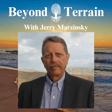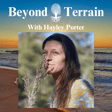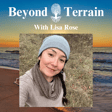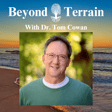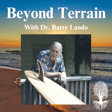Introduction and Podcast Overview
00:00:00
Speaker
Welcome everyone to another episode of the Beyond Train podcast. I am your host, Leo Vidal, I'm so happy that you're here listening to this episode today. If you are new around here, consider subscribing or following the show. If you like what we do here, make sure to comment, subscribe, leave a rating or a review.
00:00:17
Speaker
Sharing is always the best way to help support us If you would like to support us further, you should consider joining the Beyond Terrain Academy. First and foremost, it is free to join. You do gain access to Terrain Fundamentals classroom, as well as an introductory course on the true root causes of disease.
00:00:34
Speaker
However, if you do want to go deeper, you can join as a full member to gain access to some exclusive content. Monthly masterclasses, Terrain Wellness Club with Jacob Diaz and Alex Zeck, myself, of course.
00:00:45
Speaker
Q&A and discussions, the terrain studies library, deep dive classrooms, things on parasites, lifestyle, movement, etc. You gain access to so much more.
00:00:57
Speaker
truly unified community walking along the same path and some really, really cool discussions. If you pay for the year, you do gain access to a complimentary catalyst consultation to launch yourself into your terrain-based healing journey as well as a year-end check-in.
00:01:14
Speaker
Regardless, you should go and join the community because it is free to join and there are tons of free resources. But without further ado, let's get into today's episode.
Defining Health as Sovereignty
00:01:24
Speaker
Welcome, Evan, to the podcast. Thank you so much for being here. Yeah, man. Yeah, super excited to be here and yeah i jump into all different kinds of topics of conversation. So I'm looking forward it and thanks for having me.
00:01:38
Speaker
Of course. Yeah, yeah. I like to start the podcast episode off with a little introductory question. Take it any way that you'd like. i'd I like to get a little definition of health, what health means to you. And, you know, you can take it from a movement perspective, what healthy movement looks like.
00:01:52
Speaker
Anything that kind of resonates, just just let it go. So what is health? I guess for me, the way I like to think of health is One word that comes to my mind is sovereignty.
00:02:05
Speaker
I did a YouTube video on this in the past about movement sovereignty, but I think ultimately that's what health comes back to in general. um if you have that sovereign ruling over your health and you can make decisions, um in the most informed way possible for you that you know are best for you, or at least think that are best for you, then, um I think that's ultimately where health starts. um because otherwise you're, you're probably just like following along and doing what someone else tells you to do without really stopping the question. So,
00:02:38
Speaker
I think all of that for me was like born from this idea of movement and getting out of pain it it it only really started and it only really started to feel like wow I'm actually really getting to a different place when I said okay it needs to be me that makes the decisions why do I need to depend on somebody else to tell me or fix me or or anything like that so I think um I think health and to a large degree, yeah, it's like sovereignty. You need to, you need to connect to with your own body and understand what it is that is best for you and what you need. Really cool, man.
00:03:11
Speaker
Yeah. I love that answer. I mean, I think that's the way to kind of get the longevity aspect of health too, right? Like it's sustainable when you're, when it's coming from within, when it's coming from, you know, something deeper
Sustainability in Personal Health
00:03:23
Speaker
inside you, right? Like when you're just constantly doing what you're told and what other people do and what you see on Instagram or whatever, right? Like you can get some good info from other people, but at the end of the day, it's got to come from within, right? And I think that's what really allows us to have that longevity, right? Because,
00:03:39
Speaker
you're going to get fed up at one point, you know, even if it's unconscious, right? But then it'll manifest in different ways and will come out, and you know, thought patterns, maybe, maybe it does come out physically or stagnation in your movement patterns. You know, i really like that i that. Health kind of comes from within, right? You got to kind of tune in with something a little bit greater with something inside you.
00:04:00
Speaker
Yeah, for sure. And and I think the the important thing you touched on there was the longevity because I see it all the time with people that I work with because it's, the large population of people I work with are trying to resolve some kind of issue.
00:04:13
Speaker
Generally, it's got to do with like physical pain within their body. And, you know, people, most people who come to work with me have been like, they've been around the loop and they've, they've got out of pain at one point and then it came back and then maybe the half them been able to get out of pain and they go around in this endless loop. And it's a big common thing I see is that they, they go to work with someone And it either does some work or it kind of works for a little bit, but they haven't actually really understood why it's working and what the issue actually is. They've just been following what someone says. And then when they like lose that support or they lose that influence, it's like they're back to square one. They don't know what to do. And, um, I think you touched on it there. Like, I mean,
00:04:56
Speaker
One thing that came to my mind was like, if someone was to ask me, like, what do I
Movement Strategies and Chronic Pain
00:05:00
Speaker
do to stay healthy? Like, I probably wouldn't be able to answer it because like, you know, this week I do this and I feel something else next week and I just do what makes me feel good. And, you know, if I'm, if I'm like going through the week and I start to feel tired and groggy and slow or whatever, it's like, right, let's have a look at what things maybe I should be doing that.
00:05:17
Speaker
I'm not doing or vice versa. And it's a constant, it's a constant kind of ebb and flow. It's not like you just have the one way and you're set now for the next 60 years, 70 years. um You need to bring that awareness.
00:05:30
Speaker
Really cool, man. Yeah, I love that. I think there's like, the you know, the movement as kind of analogy is so helpful when you're talking about health or it's all connected at the end of the day. But, you know, just that this idea of continuously adapting to your life to the new environments that are coming, you know, they're not going to be two weeks in your life that are the same.
00:05:52
Speaker
So kind of having the ability to, to flow with that, to adapt to that, right. And not get stuck in old patterns and stuck in stagnant movement patterns, right. You got to be able to adapt to the new environment. And so ah feel like um one thing that really stuck out to me with, with kind of your philosophy and approach towards movement was,
00:06:13
Speaker
was there was this like, you got to just be able to get up and move.
Root Causes of Movement Problems
00:06:17
Speaker
You know, you, you know, you don't want to be able you don't have to like, you don't want to be stuck in any movement. You don't want your movement to hold you back at all.
00:06:25
Speaker
You know, you want, you don't want to have any pain or even if it, did you like the whole idea of like warming up, you know, needing to warm up for like, you know, 15, 20 minutes before you start moving. Like that's not something that,
00:06:38
Speaker
we've done like, if that's not something our ancestors, they just started sprinting, you know, they just started running. They just started climbing. They didn't have to warm up before they were climbing a tree because if they didn't, they would just, you know, tense up and have all this pain.
00:06:52
Speaker
Um, so I think that's kind of an interesting, an interesting way to take it, you know, like, and relating to, to pain, you know, that's something I really wanted to talk about. Um, this idea that, uh,
00:07:07
Speaker
that you were touching on, you know, you go and you see someone and you might get out of pain temporarily. You know, I'm curious, like if sometimes these, like going to see someone, you know, certain types of interventions could be like just suppressing the symptoms and not addressing the root cause of things. You know what I mean? Like, yeah, we love to talk about the root cause here. Like what's the root cause of, of our health problems when it comes to movement, like what does that root cause generally look like?
00:07:35
Speaker
You know, and I'm sure it's always different and it's always, you know, it's very individual, but like, um I'm curious if you have any patterns that you see, like whether it's not the muscle itself, if it's the tendon, if it's the bones movement structure, the ability to flow and adapt, you know, I'm kind of curious on your thoughts on that.
00:07:51
Speaker
Yeah, je generally and generally when it comes to that, like getting a root cause, one kind of phrase i always use with people and and because not because I just want to use the phrase, but i find myself coming back to it from like assessments that I do with people is,
00:08:07
Speaker
the issue has generally been called, like, it's a movement-related issue. And when I say that to people, it it's not always necessarily because, yeah, like, you know, this muscle or this ligament or this bone is, like, not strong enough.
Adaptation and Re-education Post-Injury
00:08:21
Speaker
body is using a strategy to move based on kind of based on so many things it can be injuries it can be your lifestyle but your body is essentially moving in such a way and and using strategies to move throughout the world that are leading to this thing happening so if someone has knee pain for example um more nine times out of ten for a lot of people unless they've had like ah an acute injury to that knee in recent times The issue is probably coming from the fact that other parts of their body are are using suboptimal strategies. And now the knee is having to somehow take up the slack for that.
00:08:56
Speaker
That's a very broad kind of um example. But generally, that that's what it is. It's people's strategies for moving. and And generally, people don't really like to like peel the layers back and go back to what's causing this. Because...
00:09:12
Speaker
you know, it maybe takes a little longer sometimes, or maybe it involves doing some boring exercises that no one's ever seen before. But ultimately, these are the things that will will get you out of pain. And um you want the structure to be moving in the way that it should. And then, you know, things like your muscles and the tissues around it will start to adapt and and do what they're supposed to do.
00:09:33
Speaker
Because ultimately, from my experience and um from what I see, it comes back to how are the joints moving? and coordinating together and then everything else kind of reacts as a byproduct of that.
00:09:49
Speaker
Yeah. Yeah. Interesting. Yeah. It's, it's, it's kind of a complex thing too. Cause I feel like, you know, kind of the cause might shift a little bit over time. Like kind of what I'm thinking about is I broke my humorous playing hockey when I was like 17.
00:10:05
Speaker
seventeen Right. And snapped it clean in half and fortunately didn't get surgery or anything. It just kind of hung there. And the bone literally fused back together, like kind of the most amazing thing ever. Right.
00:10:16
Speaker
um Obviously, I was ah in a cast and I was kind of like, you know, had my arm across and um I didn't move it for six months. So one of the most amazing thing that I saw was not moving it for, sorry, six weeks only.
00:10:30
Speaker
my arm shrunk. It was just pretty much skin and bone. i had no movement, no ability to even
Holistic Healing and Reintegration
00:10:36
Speaker
move my, my elbow up and down. Cause I didn't move it for six weeks. It was amazing. and almost felt like it was like ready to just perish.
00:10:45
Speaker
You know, now like, It kind of in my own experience trying to search for this, that root cause of, you know, now I have all these shoulder imbalances and it's it's gotten a lot better over time, you know, of course, and um trying to flow into more natural movement patterns has been the most helpful for it all.
00:11:05
Speaker
But You know, it kind of felt like things were shifting, you know, where obviously the probably the root of it was the break, but eventually the break healed itself. And then it kind of shifted into a shoulder and then maybe a spine issue or something like that. Right. Like, yeah, it's kind of interesting how it can kind of move and flow. And it's kind of the body adapting to its situation like you were kind of talking about there.
00:11:27
Speaker
Yeah, yeah. And for a lot of people, what you'll actually find is people who have developed like some kind of chronic pain that they can't really seem to get rid of. what What I see a lot with people is they've had an injury like what you've had, like they've broken a bone or they've dislocated a joint or a tear in the ligament.
00:11:45
Speaker
And they say, yeah, I like, you know, I had my surgery or I just did my rehab, whatever was required at the time. And yeah, everything was kind of fine since. And now ah like just these last like three years, my hip is in so much pain.
00:11:58
Speaker
And the big thing I see is that when it's like, it's this local approach again, if someone injures their knee, I'll always nine times out of 10 see that they weren't they weren't actually reeducated on how to start loading that leg again.
00:12:10
Speaker
It's like, yeah, they made their knees strong and their quad strong. But also, they never really taught their body how to reintegrate that now with their hip with their foot with like when they actually move throughout the world.
00:12:22
Speaker
So like what you you've kind of mentioned, when you have an injury or a surgery or anything like this, that's an insult to the body.
Critiquing Traditional Movement Practices
00:12:31
Speaker
And the body will adapt almost always in reaction to that.
00:12:37
Speaker
Now that can happen in different ways and to different degrees. But ultimately if you have an injury, even if it's just you like, you know, stub your toe against the against the wall, it's like, there's something happens in your body that it goes into like that protective mode. And if you're not kind of conscious of, okay, I need to heal the pain, but also I need to make sure that my body actually remembers that it needs to load onto this leg, or it needs to be able to like move my arm in a certain way.
00:13:03
Speaker
If I don't really re-educate that, then the body's not just going to bring it back. It's still like living in the past. It's still trying to protect you from that injury that happened that you've never really taught it to say, look, it's okay.
00:13:14
Speaker
It's fixed. We need to be able to do this again and move in this way again. And that's like a huge thing. And again, like these movement related issues that I tell people, like that's a really good example of how how that tends to show Someone's had a previous like traumatic injury where it was like, ah so they can,
00:13:33
Speaker
remember a moment when this thing happened and like yeah i did all the things and i'm fine but now i just have this back pain for the last 10 years you know and ah generally it's like that it's the strategies that your body moves and you can be sure if you have an injury your body will do something to avoid loading that area or using that area for a period of time and then that just develops into a pattern that your body uses yeah Yeah, there's also this idea too, like we're told like rice, right? Whenever you rest, ice, sea, I don't know what the sea stands for, I forget, but elevation, you know, bright unloading unloading it, right? Like, yeah um and not putting any pressure on it and not, you know, and there's probably, a you know, certain
00:14:22
Speaker
amount that that's going to be healthy for healing. But, you know, there has to be a point where we do reintroduce that, right? So like our mentality is always to support, or, you know, like, modify or make things, you know, comfort easier.
00:14:37
Speaker
And we're not reintroducing that kind of discomfort that, you know, that pressure that force that that we need to continue growing coming back. um You know, back to kind of my example, you know, just to highlight,
00:14:50
Speaker
um kind of what you were talking about there is like, i did I went through the physio, I did my physio, you know, amazingly, you know, i only did physio for one arm, you know, so even though, you know, i broke this arm, you know, i probably should have been training more balanced way. So now this range of motion is completely different than my other like shoulder and again, like it's balancing out now that I'm doing whole integrated movements rather than just trying to isolate each muscle and, you know, eat even one arm at a time, you know, rather than now I'm like introducing the crawling and the, you know, different movement patterns like that, even climbing, different stuff like that.
00:15:29
Speaker
it it trains the body holistically rather than just that one area, you know, and so the problems for me were the absolute worst when I was doing physio type exercises, very isolated, very unilateral stagnant movements.
Whole Body Integration in Training
00:15:46
Speaker
And I was going to the gym, and I was doing the same kind of, you know, bodybuilding, hypertrophy, little bit of maybe powerlifting stuff, but it was all very isolated.
00:15:56
Speaker
Everything was so isolated. i never did you know, I play sports now, but I didn't play sports for a while. Like there's a few years. And so even sports, you're getting that whole body integration, you know, and again, that's, what's so cool about your practice is that,
00:16:12
Speaker
you're not doing any bicep curls there on Instagram. You're kind of, it's always the whole body. It's always integrating every single thing in the flow of the body itself. Can you speak a little bit more to that? Cause I think that's, that's what's absolutely necessary in, in any movement practice, in my opinion.
00:16:29
Speaker
Yeah. Yeah. Yeah. I think that, you know, big thing that forms, uh, you know, a huge part of how we look at things in terms of movement is, you you know, your body doesn't know that it's in the gym. It doesn't know that it's, you know, in a fight that it's, you know, on the pitch in a game, but ultimately you're, you're demanding something of your body. You're asking it to like, be able to perform a task. Like I'm going to get up, I'm going to walk to the kitchen and I'm going to you know make dinner and your body will, you know, for most people, hopefully that's not like a big stress, but like, it's a task you're asking your body to do and it needs to move and perform certain movements be able to do that.
00:17:08
Speaker
So, giving your body these these kinds of tasks and allowing it to do it in the most efficient way possible ultimately is what will serve you best in the long run because our bodies are about efficiency. we want to conserve energy. we want to um be able to like use energy in ah an efficient way for as long as possible.
00:17:28
Speaker
And ah yeah, if you go into like the gym and you're just like there and you're just doing this or you're just doing like this kind of movement, it does have its place and it does serve its purpose. But yeah,
00:17:39
Speaker
the the where i you start to question it a little bit more is like okay at what point do you need to either maybe do less of that or do you need to integrate something something different like you mentioned crawling something a little bit different up that gets your body just to perform a task and there's probably an element of like a a subconscious element of like, if you say, right, I'm just going to get this way. And I need, to my only thing is I need to lift this over my head and the most efficient way versus I need to like, make sure my shoulder blades are down and I'm like up against the bench here. And then I strictly press.
00:18:12
Speaker
Um, you know, think of real life scenarios. Is that going to serve you in the long run? Particularly if that way of training is something that you just do over and over again. So, you know, the whole thing of like, when I when i do a bicep curl, for example, like sometimes I'll tend to like, I'll lift more weight than I can lift and just tell my body, right, if I want to curl this way up, get it up there like in any way you
Task-Based Training vs. Structured Routines
00:18:35
Speaker
can. So it integrates like a push to the floor or a turn in my body or it brings my lat into it or my hip or something.
00:18:42
Speaker
Um, So I'm asking my body to perform tasks. And that's a huge thing that we do with people, especially when people are in pain or maybe their movement in certain positions has been inhibited.
00:18:53
Speaker
We won't always just say, like, all right, we're going to do this movement. This is like the form points. You need to take them off. It's like, no, all right, go into this kind of position. Now just reach for that thing on the floor over there.
00:19:05
Speaker
And we give them tasks because the body then adapts and moves into certain positions when we kind of let go a little bit and say, Okay, how are you going to reach and pick that thing? in the most efficient way possible that doesn't cause pain and you know ah isolation has its place but it doesn't serve these tasks that our body essentially and our our nervous system is kind of wired to do um when you're on the pitch it's like my task is to run and do whatever then the game demands of me but you know bicep curls and um these type exercises these real isolated exercises they may not
00:19:42
Speaker
best serve you doesn't mean they can't actually play a part in somehow improving your performance but but ultimately you need to have that balance between okay if i'm asking my body to move in certain ways in my life but how i actually really train it and load with a lot of external load is completely different then maybe you're going to have some problems um so for us what we do here like yeah integration is hugely important um and isolation type stuff has its place but ultimately where we're trying to bridge the gap is to say right when is enough enough or when is like maybe an integration of both required versus just you know the isolation and the aesthetics and and all these kinds of things particularly if someone's in pain sure sure
00:20:31
Speaker
I guess it partly depends on kind of your goals too, right? Like, you know, not to demonize anyone's, you know, specific, you know, interest or whatever, right? Like, you know, that's kind of half the point too. Whatever you're interested in, that's, you know, that's what you should do. If you love to do it, there's something to say about that too, right? Like, um you know, I've been loving golf lately. Is golf, you know, the best,
00:20:57
Speaker
thing for the body I mean, you're kind of only swinging one
Balancing Passion and Health
00:21:00
Speaker
way, right? So like, actually, like, it's been kind of interesting for me to try to balance that out, you know, and try to get that same action going the other way. So I can keep that, that flow and natural balance of the body itself.
00:21:15
Speaker
um you know because there's a lot of common injuries when it comes to kind of doing that one motion. And I think the motion is kind of interesting, because it's certainly not an isolated motion, but you're kind of isolating out that one side of the body, which is interesting to think about. So even just having, you know, these ideas in the back of your mind, when you are doing the things that bring you joy and what you love, you know, is kind of, it's kind of really good, you know, like maybe, you know, bodybuilding is a little bit hard on the body when you're constantly doing isolated hyperrop hypertrophy, but kind of integrating this functionality into that, right.
00:21:49
Speaker
To again, come back to that longevity, right. Cause we don't obviously don't want to get injured and end the career early. Cause you know, that's where the balance comes in, you know, whereas like, if you love it, you want to do it for a long time too.
00:22:01
Speaker
You know, you don't want to have to give it up because of an injury or because of pain or because of whatever. Right. So, Yeah, really nu no that that that's ultimately what it's about. Like it it's like our whole like philosophy and approaches Most people, like if someone's suffering from pain, most likely, because I've been through this myself, most likely it's about much more than just like a painful shoulder or or the back pain or whatever. It's like that that's the thing that's like always there, but more than likely you that's having a negative impact on your life in some form, be it your relationships, be it your mental health, be it it's because you can't go out and, you know, take ah a run in the park for half an hour once a week. And that's what really like lights you up
00:22:46
Speaker
like their life has been impacted in some way and ultimately what we're about is you just need to do what you need to do to get yourself to be able to to do the things that bring you joy and then do that sustainably for you know the rest of your life um so yeah if if someone's goal is that they want to build a ton of muscle and like look like a bodybuilder then like by all means like i i I really don't tell people not to do it.
00:23:10
Speaker
Just understand that if you start breaking down and have pain, maybe, you know, don't be so surprised.
Physical Pain and Broader Life Impacts
00:23:16
Speaker
Why? Just, just the same way as if someone just like, I just like to walk for an hour or like half an hour each day. It's like, that's fine. But then if you do want to go hike a mountain or you do want to like do something more higher impact, don't be surprised when, you know, your knee blows out or whatever it is that's going to happen.
00:23:33
Speaker
Um, And that's ultimately it. What is it you want your body to be able to do every day? How do you want it to be able to feel? Then, you know, do the things that are necessary. And that's ultimately it. We're not about, you know, we're not like muscle building coaches in what we do. We're not rehab coaches in what we do. Like we don't...
00:23:51
Speaker
we're not about one outcome or about whatever outcome it is that you want and seeing what it is that's stopping you from that and then helping you get back to that. And yeah ultimately yeah it's helping the people resolve pain in our case, but ultimately it's like, we're asking what's the problem and what is it you want to be able to do? And now let's fill in the space in between and, and you know, map out that way to, to allow you to do that.
00:24:16
Speaker
Yeah. Yeah. Yeah. Again, we kind of see the parallel there, like with, with just health in general, you know, like it's like kind of just a little microcosm of the exact same thing, the exact same process really well laid out.
00:24:29
Speaker
Yeah. Thank you Yeah. Yeah. I'm kind of curious, you know, the ancestral athlete, that's your handle there. I'm, I'm curious how you, that, how that came about, you know, what, how ancestral movement inspires your philosophy, you know, how that name came about. Cause I love studying like the primitive indigenous populations and their movement patterns. I think it's,
00:24:49
Speaker
kind of the gold standard you know so I'm just kind of curious on on how that came about yeah I think at at the time it was um I was kind of down that rabbit hole as well of like ancestral health at the time yeah primarily I was like doing a lot of looking into
The Ancestral Athlete Philosophy
00:25:05
Speaker
nutrition and different aspects of health as well but um primarily at that time I had been going through a lot of injuries and the traditional SNC and e and i was you know involved in team sport like my whole life that kind of led to a lot of these injuries so I was like right I there there must be a reason why this is happening and this can't be the way that it's like supposed to be and I went down that rabbit hole and um it was it was probably from the perspective of health in general um not so necessarily heavily focused on ancestral movement but one thing that did really kind of resonate with me when I when I heard it and and came across it is like
00:25:46
Speaker
yeah look we're just our history and our our ancestors were not designed to like sit in a car all day or sit at a desk all day um it's just we're doing things now that just is so different and something about it just clicked um And I was like, we just need to get back to more of like, even a little bit closer to to what it may have been like, or the kind of things our body expects on a daily basis. And i think at that time, the ancestral athlete lead was about, i was trying to pull myself back from from that place of like injury and um feeling like, okay, well, my body is just completely working against me here. um And I guess the ancestral athlete was more
00:26:31
Speaker
trying to build like the you know the perfect athlete but for me it's more about the human i have this kind of like um phrase that i've like spoken about on a lot of other podcasts in the past where every athlete is a human and every human is an athlete and the one I think people understand is every human is an athlete. They're like, oh yeah, I can be an athlete. But people don't understand that every athlete is a human, ah firstly.
00:26:57
Speaker
And a lot of people are trying to optimize the athlete when the human is like, they have to nail the basics of just being human from like nutrition, movement, all these various aspects of health.
00:27:09
Speaker
But yet we were trying to like put extra five kg on our squats and improve our power output and you know, all this stuff when people were actually just breaking down with injuries doing that. So for me, it was kind of like getting back to being a little bit more human first before you actually become this like high level, know, like polished athlete.
00:27:28
Speaker
For me, people were actually like completely missing just the foundations. We weren't, people are not nailing that. they they They sit at a desk for 10 hours and then they expect they're going to go to the gym and like perform like a professional athlete.
00:27:41
Speaker
And it may work for a while, but ultimately it's probably going to result in some kind of issue somewhere.
Lifestyle Shifts for Health
00:27:47
Speaker
And that's kind of where it came from. I hope that you guys are enjoying the episode so far, and if you are, you will love the Beyond Terrain Academy.
00:27:56
Speaker
I've taken everything that I've learned from studying the terrain, speaking with the greatest minds in the terrain field, and have distilled it down to the fundamentals, easily digestible content and material, as well as a place to go even deeper and more specific into the terrain as well.
00:28:13
Speaker
Becoming a full Academy member gives you access to monthly master classes, the Terrain Wellness Club, the Terrain Studies Library, Q&A and discussions, as well as deep dive classrooms and things like parasites, movement, terrain lifestyle factors, as well as a space for reflection.
00:28:29
Speaker
There's so much available in the Beyond Terrain Academy. And don't forget, you can pay for the entire year to gain access to that catalyst consultation to launch you into your healing journey, as well as a year in check-in to ensure that you've been putting into practice the terrain principles to keep you accountable.
00:28:46
Speaker
But let's get back to the episode. Yeah. Yeah. There's something to be said about like a lifestyle shift when it comes to thinking about healthier movement, health in general, right? Like it's not like, it's really tough to kind of spend that hour day, couple hours a week to then like become healthy or become, you know, have healthy movements. You know, what are some kind of lifestyle shifts that,
00:29:12
Speaker
helped you kind of achieve that, you know, like what what were the things that you could do in your daily life, you know, rather than maybe taking the elevator, you know, walking or whatever it is. I'm kind of curious. Yeah. So i guess for me at the beginning, it was literally just trying to input more movement into my day and realizing that even though I have a desk job or at the time I had a job that required a lot of driving, I was like, um i was doing a lot like service work all around the country.
00:29:39
Speaker
i was like i don't i don't actually have to sit here for eight hours straight or four hours straight i can like sit here for 10 minutes and i can get up and then come back um so like kind of seeing these little pockets and this is kind of like the sovereignty thing that we talked about the start it was like i could make that decision for myself and actually heard this from foot collective um i'm not sure they're actually canadian uh originally um I heard it first from them where they they were like, know, nobody is like legally allowed to tell you, you have to sit for eight hours.
00:30:13
Speaker
All right. And I think what they were talking about as well was like, um I think they were talking about like standing desks. It's like more like your employer can't refuse to like provide a standing desk if that's something that you like ask for, you know? And it was like these things I was like, yeah, like, I mean,
00:30:32
Speaker
you know, there's so many things I'm doing just because I think I have to, and someone else is telling me I have to, but i don't actually have to do that. um And ultimately for me, it was like what you, it was a lifestyle shift, it was more a mindset shift of, okay, well, if I'm prioritizing my health, then I really have to say that, well, screw everyone else. My health has to be the most important thing to me.
00:30:54
Speaker
And if someone's trying to make me do something and tell me I can't do something that's going to help me better my health, then no, I'm sorry. I'm not in, like I'm, I'm making the decision for myself. So it was kind of like, um, probably not even like a rebellion, but I had this like inner thing where going to rebel against like these people who tell me i can't do these things. And, um,
00:31:14
Speaker
you know, it was a huge driver for me and in what I'm doing right now because of like, yeah, I don't want to go drive in a car for whatever amount of hours every day and come home and feel stiff and tired. It's like, I want to have like autonomy over my day. I want to be able to move. I want to be able to do all the things that I know that are going to help keep and make me healthy. Yeah.
00:31:33
Speaker
and give me give me that freedom um to be able to make those decisions so um for me it was it was the mindset shift and realizing nobody can actually tell you like what you have to do particularly like that when it comes to your health and i think most people have never really stopped to ask themselves that question it's like yeah i always hear this thing about sitting for 10 hours a day but i never realized i don't actually have to do that And, you know, ultimately it's as simple as
Mindset Change and Health Autonomy
00:32:02
Speaker
that. and it's more like it's that aha moment.
00:32:05
Speaker
And once you get that breakthrough, now you start to see the world very, very differently and start to do things very differently.
00:32:14
Speaker
Yeah. Yeah. I feel like that can also be like the hardest part, right? To have that kind of paradigm shift in your mentality, you know, like. And this is like, yeah.
00:32:26
Speaker
go ahead go ahead now this is the thing like ah online like that it's like it's frustrating to see sometimes like people are always talking about like um you know is this the best exercise for this and you know if you want to actually really get your glutes you have to do it in this position and you know with this machine i'm like you're completely missing the conversation like i like i understand the value of it and people are like specializing in these areas but ultimately most of the people who are listening to you like they're actually like they're probably just trying to find a workaround because they can't do a different variation because they have pain like ultimately we're missing the fact that people are not realizing that
00:33:06
Speaker
It's not what you're doing in the gym is the main, main problem. It can be part of it for sure. But like if you're not fixing the fact that you're just not moving for the whole day and that happens, you know, five, six days a week or you never go outside and get some sunshine, it's like these are the problems, like really.
00:33:25
Speaker
and you know the arguments about whose system is better and all like it's probably a lot of people like who think they're leaders in the space and have big egos and they want to be right like it's ultimately like i just think the conversation is completely like miss missing the what people are actually struggling with people are not struggling because they're doing someone else's system over yours it's like they're missing something far more fundamental
00:33:51
Speaker
That's really cool, man. I love that. No, I love that. I'm go glad you said that, dude. That's so, that's so good. Yeah. I remember, you know, like a lot, a few of the guests that I've had on when we've been kind of discussing movement and, um, you know, even resting, you know, like yeah it's like something that one one of the themes that keeps coming up is the next position is the best one.
00:34:15
Speaker
So, you know, like when you're sitting around, like, yeah, it's okay to sit. But like, that's the things that floor sitting is is so amazing because you're constantly looking for that next position. You know, you're like, you're moving around.
00:34:27
Speaker
um rather than being on the couch and kind of sinking into it and you're not moving. You know, like there's no, you might adjust from one butt cheek to the other because it's falling asleep. But like, you know, you're not getting that like, ah like little tidbits of movement, right?
00:34:45
Speaker
um Like the next, the next movement is is really important when it comes to resting
Creative Movement Practices
00:34:50
Speaker
positions. And um yeah, like, you know, when I, when it comes to like my training now, like it's so much more,
00:34:58
Speaker
creative and free flowing. Whereas it used to be that stagnant, you know, Monday, Wednesday, Friday is this day, Tuesday, Thursday is this day, Saturday, Sunday is this day, you know sprinkle in a few rests.
00:35:14
Speaker
But it was like kind of that same, there was no movement, even in my movement, you know, and it was the same lifestyle wise, there was no movement in my lifestyle.
00:35:25
Speaker
It was, you go from the bed in the morning to the toilet to the table to the you know to work to the to the couch you know yeah and there's car in between yeah yeah it's amazing yeah yeah yeah yeah it's incredible yeah and another thing is like people will really underestimate how little they're moving they think they're moving more than they actually are in a day um and again it's it all comes back to that awareness you know and uh like you say you know if you're getting to that point where you're
00:35:57
Speaker
when you go to the gym or you're doing like your training, you're actually coming with that like exploratory approach or the curiosity approach um I think ultimately if you can be at that point and you're feeling good in your body and like you're still, you know, feeling strong, like that's a really good place to be because like i'm I'm quite similar. I don't follow a program now. I'm just kind of giving my body what I feel it needs. And like largely my sessions, I'm like hitting the same basis every single session, but I'm just doing it with a different type of movement or a different way of loading.
00:36:31
Speaker
And this is this is the problem. i Like I posted a a video earlier. on my story yesterday of me doing these like landmine kind of lateral lunges. And I got a reply saying like, like why do it in this position? Like what's, what's this doing?
00:36:46
Speaker
And I'm like, I don't know. It's just, I'm, I'm just hinging. I'm loading my hip. Like I did in my last session. I'm just doing it differently now. Yeah. You know, and like, there is a reason and, if someone's in pain yes i you know we can maybe one variation is better than another
Curiosity in Health and Movement
00:36:59
Speaker
but ultimately the the thing that i guess like uh this is more of like a ah personal problem like that i need to just deal with is like i get frustrated when people ask these questions cause i'm like why are you not asking maybe you know what pattern is this improving or like you know like what um what what is your intent here so like why is this why would i do this variation it's like
00:37:23
Speaker
I don't know, like you can use a dumbbell, you can use a kettlebell, a barbell, I don't care. Like I'm just trying to drive a particular movement pattern, I guess. um And it's, and but that's the thing. It's like people could look at my training and say, wow, there's no structure or there's so much variety, but ultimately,
00:37:41
Speaker
Every session I'm like I'm loading my hips and I'm practicing my hinge pattern. Sometimes I'm doing it i hold weight in two hands sometimes in one sometimes it's one leg at a time sometimes there's both legs together but I'm just it's the same patterns basic patterns that I'm just reinforcing and strengthening and putting some variety behind um and for me that's what my training like really consists of like just giving my body exposure in different ways but ultimately I'm training the same qualities and I ah feel pretty good you know my body's moving pretty well so it's it's a pretty good place to be and that's again the sovereignty when when you're in the pain and when you're trying to follow like this system and this guy says this you're trapped now because what you don't know how to go outside of that you have to follow the system and you have to follow
00:38:28
Speaker
you know, whatever these like strict rules that someone has created. um And you lose that ability to say, to ultimately come back and say, well, you know, what's best for my body and what makes it feel good.
00:38:40
Speaker
i'll Really cool. Yeah. Half of it is like trying to figure out what the right question is to ask. Right. Like, what am I, what am I trying to figure out here? And I think that curiosity piece, like you were saying, ah is fundamental to the sovereignty, to the health, to the freedom, right? Like just,
00:39:00
Speaker
retaining that curiosity because curiosity is not something that we have to discover. It's something that you have to rediscover, you know, because as, as kids, we're all so curious, you know, and when you look at children, man, they'll move like any which way doesn't matter. They're resilient and they can move and hang and climb and throw and whatever.
Self-Awareness and Personal Problem-Solving
00:39:19
Speaker
Like it's just innate. It's within us. And I feel like that's part of movement too. It's not like discovering it's rediscovering, you know, what we once had. And, and that comes through kind of rediscovering that curiosity and trying to figure out, you know, like, you know, what, what's the, what's the, what's the point, you know, what's the meaning behind this, you know, look a little bit deeper.
00:39:40
Speaker
Yeah. Yeah. Yeah. And it's, it's a very interesting thing. Like when it comes to pain as well, like, you know, when you get pain, you should be curious and say, okay, ah why does this happen? And then what happens if I do this? And what happens if I turn my body this way?
00:39:54
Speaker
Well, most people's reaction is, oh, I better get that number for the physio and have them fix me. like whereas like I could wake up tomorrow morning and say like yeah that left hip feels like it's a little stiff and I'm like right let's try like load it this way and I'll stretch into it in a certain position or do some kind of like a hinge pattern and like oh yeah if I actually turn that way and load through there it it opens it up and things are feeling good again and problem solved you know And maybe like a look at, you know, strengthening a couple of things that might need it over the next few weeks. But ultimately, it's, um yeah, it's how you relate to it. And if kind of some kind of stiffness or discomfort or curiosity or stiffness or discomfort, like, it I guess primarily it should spark to curiosity and say, I wonder why it's happening.
00:40:40
Speaker
Is it because of something I'm doing or is is there something else going on? But yeah, we always try to straight away, I'll outsource this and and have someone fix me. And then that doesn't work. And now you're kind of, you're s slipping now and it starts to become chronic.
00:40:55
Speaker
doesn't It doesn't mean you shouldn't seek some help, but the big thing that I always encourage people is, you know, if you're going to come work with me or anyone like in in our side of things, like come with, like, I want to learn from this person so that i don't leave at the end of all this. And maybe my issue kind of gets fixed, but I have no idea why, what happened, why it was happening in the first place.
00:41:21
Speaker
Come away saying like, I know why it happened. And if it happens again, I've got And that's ultimately what we like anyone who works with us or comes into our sphere is we want them to at least have a some kind of understanding as to where it may be coming from and and what helps to fix it.
Intentional Learning in Health Journeys
00:41:39
Speaker
Yeah. Yeah. It's amazing. I can totally relate to that. You know, like it's the intention, you know, like I've, I've worked with tons of people. I bounced around from physio to physio cause things just weren't getting better.
00:41:53
Speaker
you know, and I tried out different modalities of different people and different whatever, but I had the wrong intention. It was like that intention of magic bullet. Come on, let's like fix it and let's move on.
00:42:06
Speaker
And there was no responsibility. There was no sovereignty in that. It was just doing as I was told. And then, you know, throughout this, you know, whole, my whole journey, obviously, like,
00:42:17
Speaker
It's kind of coming into this mentality of like, all right, it's time to kind of take some responsibility for myself and figure it out. and And then, yeah, going and working with people now, it's like, you know, I'm working with people.
00:42:30
Speaker
a Like, I'm not going to see someone and they're going to work on me. like I'm going to go and work with them. with whatever I do. Like, I want to learn, I want to know what's going on, what are you doing? You know, and it's something like I'm in there and I don't know if I'm annoying or whatever, but I'm like, Oh, why you do that?
00:42:46
Speaker
what Why is this? Why is that? You know, I'm always asking like that. Why, um you know, why are we doing this? You know, even in like, yeah, anyways, anything that I do now, I'm like asking that, which I think is a powerful way to learn, right? Because these people like they're, you know, you want to build that relationship of, you know,
00:43:04
Speaker
they might have the, you like like yourself, you'll have the expertise, you know, you have the expertise and movement and movement patterns. But at the end of the day, the individual, they're the expert of themselves, you know, like they they got to know what's going on in their body. theres No one else can know that, you know, like they have, it has to be that working relationship, which I think is is amazing. And you embody that so well. So that's really cool, man.
00:43:27
Speaker
That's really cool. Yeah, it's cool. cool yeah Sorry, go ahead there before we move
Fascia's Role in Training
00:43:32
Speaker
on. please no yeah yeah no it's it's nice to hear that and the the one thing i always encourage for people that people have actually commented on this a little bit in some of the content is like i'll tell people like um okay like this do this move and here's some of the key things to focus on but i always kind of finish with but ultimately you need to play around in this position and see what we like what feels best or what line of tension or what position feels best because again it's like right we'll we'll kind of
00:44:00
Speaker
will give you the roadmap to get there. But now once you're there, you need to really find that way. um And again, it's like, it's like what you said, it's kind of another level of just saying, yeah, be a little bit more invested in the process and not just do what I say, it basically, you know, like you need to have some awareness.
00:44:19
Speaker
Kind of the last, like there's two kind of last things that I want to touch on um before we kind of wrap things up here. You know, one was, like the role of fascia, you know, what role, that like, how does that inspire your training? Because that's something that really, like, piques my curiosity. I don't know really enough about it, but it's like, it's kind of like that underlying flow of the body, right? It's not that, it's like something that usually people don't consider in movement. Like, we think about our muscles, our ligaments, and our bones, and our structure, but we kind of forget about that
00:44:55
Speaker
like the entirety of the body itself and the way that it flows like each muscle. Like i remember you used to hit back and biceps at the same time. Cause I was like, Oh yeah, like I'm pulling. and And eventually actually kind of interestingly, I was like, you know what? I want to hit back and triceps because they're like connected to one another.
00:45:14
Speaker
and which was kind of an interesting way I took my training and part of that curiosity piece. But yeah. Yeah. just kind of curious on that role, like that role of, of fashion, how that inspires your training and and movement in general.
00:45:26
Speaker
Yeah. Um, yeah, the fascia is something we've kind of like dove in and out of various stages. um ultimately it's it's not necessary it's not something that forms the real kind of core of of how we approach things uh we we do uh do like myofascial work with people as in we'll have them do like myofascial releases and you know like self myofascial releases um because i do think there's benefit in that and i i think
00:45:58
Speaker
The way I, or what I kind of call that in in how I approach with people is like, we're we're just trying to improve some tissue quality. If you've got areas of your body that, you know, maybe over time is like, okay, you can't really, your body's ability to be able to move into these areas and use these tissues has been inhibited for one reason or another.
00:46:17
Speaker
So using like a tool, like a lacrosse ball or, you know, something like this, where we can actually
Individualized Health Approaches
00:46:23
Speaker
get into the tissue, stimulate it a little bit, bring some hydration, some blood flow, um just kind of change the properties of that, let's call it stagnant tissue. um Then maybe when we go to do like some of our movements and some of the things afterwards, maybe we're just going to open up some more opportunity now to start bringing that back online.
00:46:43
Speaker
um that's one of the bigger ways in in which I would kind of use some of those things from the fascia world as regards like the fascia lines and fascial change or chains. um again, i think it's kind of like one way of looking at the body.
00:47:01
Speaker
It's like anything, they're all, everything is, you know, it's a tool, and how you use it will kind of determine, I guess, uh, where you go with it. it But again, I think just fascia is... um I think you know there's a lot of evidence out there that people can benefit from that approach to their training. But then people can also benefit hugely. And the kind of way I look at it is more like what are the bones doing and the joint positions?
00:47:29
Speaker
yeah Because it's like the too if you imagine the skeleton, the bones and the the joint capsules, this is like the deepest layer of your body from a movement perspective.
00:47:40
Speaker
It's kind of where it's originating from. you know, I can't move my my elbow without the the joint moving at that very deep level. And then the tissues around that respond and react. And and um it's almost like the the tissues won't have anything to do if the bones don't move.
00:48:01
Speaker
So they kind of respond to the joint position. And it's joint positions that triggers the muscles to to do whatever it is to that they need to do. so um yeah the fascia stuff is is something my i'm not like super deep in and it's definitely not a huge part of my practice um and and how we go about things but i would say a lot of those fascial lines um that people talk about they're basically just movement patterns like if you talk about like this anterior oblique sling or the um you know the functional lines the back superficial back line
00:48:40
Speaker
A lot of this stuff is like if you just watch a person walk, it's like, yeah, you can look at it to say, okay, they're like pronating their foot on this side, they're supinating on the other, they're internally rotating here, externally rotating here.
00:48:52
Speaker
It's kind of very similar. It's just looking at it from a different lens. um so i guess like i'm after rambling now but ultimately i don't i would say that i'm not deep enough to have a real opinion on it um i do think that there's a lot of value and there there can be a lot of value and benefit from it um but i i think it's another one of those things that's like everything else in the fitness and rehab industry it's it's causing more divide and more conflict than it is any kind of real answers and solutions it's like it's just confusing people even more yeah well i i do really value that answer in your opinion there because um yeah it's not one you hear too often you know and and i think you know the important thing is you mentioned it's tool yeah right like it's a tool way to view the body you know but we don't want to engage in any sort of reduction we don't want to
00:49:44
Speaker
kind of negate what we're seeing. Like, you know, when, like it kind of comes back to this whole philosophy you've been kind of presenting here today, like that tuning into the body and playing around in a position and trying to figure out what the, the right pattern is for you, kind of regardless of the theories that we have, you know, like trying to tune into you as the individual. And maybe there is some sort of objective, you know, best, know,
00:50:11
Speaker
pattern like ideal perfect efficiency but you know whether that's achievable and whether or not any of us are there and you know even like how are we going to determine that 100 you know like we can know generally but um like perfect angles like are we just red producing things are we just getting away from what's real what's in front of us and what is like individual about each and every one of our movement practices and each and every one of our our health in general so yeah Yeah, really, really cool perspective, man. I i do i appreciate that a lot.
Embracing Health Sovereignty
00:50:45
Speaker
Before we kind wrap things here, there anything you want leave the listener with? Anything that you'd like to impart before let you guess...
00:50:54
Speaker
um i guess I guess the biggest thing, and we probably touched on a lot of the messages I would like people to kind of take and and and start to employ into their life. But I would say number one is, yeah, realize that you're like the boss, you know, you're the boss of your your health and whatever that journey is for you. So don't don't just follow blindly, particularly when it comes to your health, because I think we've over the last couple of years in particular people have found that out that just following advice from from people who they have some more authority but maybe not authority in the realm of health and people just just follow along um so number one is like you become your own boss and really make sure you're taking control of like the decisions that you make for your body as best you can if you don't know the answers
00:51:46
Speaker
take that like mindset when you come to talk to someone like me, for example, and like come with, I'm not the expert that's going to tell you everything. Come and ask me the questions, find out for yourself, like how much I can help you, but don't just rely on me to give you everything either.
00:52:01
Speaker
Cause I will be lying if I said I could do that for every person, you know, it's it's, I think, well, I have the tools and I can, yeah, I can like practically help you. But ultimately, if you want to change or looking for it, then you need to take control of that for yourself. um And yeah, the other thing I would say is just from like a more like,
00:52:24
Speaker
practical standpoint really like looking at what's out there now particularly online is don't look for who's right because nobody's right no all these people who think they're right and they're not and I'm not right either I just I just have my tools I'm trying to interpret them and use them as best I can and I'm also trying keep an open mind and round out my approach and um but ultimately like i have the same tool as someone else who like maybe identifies what a certain system has they're just using a different brand of tool um and maybe maybe they like what they've got is like they've got a more well-rounded tool and maybe i'm missing things in my toolbox but ultimately like we're we're all trying to achieve the same thing and
00:53:09
Speaker
um the language we use the maybe the way we view the body can be different but like especially those like systems it's like they've just compiled knowledge into a different way of communicating it but stop thinking that someone's right and wrong um just someone someone's going to be more right to suit your situation and will resonate with you more then explore that but um yeah, this whole divide of like, everyone says they're trying to help everyone get out of pain and, you know, this musculoskeletal problems, but ultimately they're just fighting among themselves and trying to, trying to like show who's the most right.
00:53:50
Speaker
Yeah. Well put, man. Well, I appreciate your humility. And I think that you embody what a true, you know, practitioner looks like, you know, a true, True teacher. That's what it what it comes down to, right? And so so I really appreciate that, man. I think that's really important. And that's kind of people that I like to have on this show. So I really, really do appreciate you coming on.
Conclusion and Listener Engagement
00:54:10
Speaker
Where can the listener find your work? How can they support you? Where can they find you? Yeah, so best best place to start is Instagram. That's probably our our main channel. So it's at d.ancestral.athlete.
00:54:24
Speaker
um So that's the best place. You'll kind of find links to everything from there. But we've got YouTube. um We've got a new program that we launched recently, which is our nine-week corrective foundations.
00:54:36
Speaker
And that program is very different anything we've done before. So that's essentially a lot of the things we've been talking about. This is about stripping movement back to like its foundations, peeling back the layers.
00:54:47
Speaker
But ultimately, the main goal of that program is to give you not just solutions and exercises and and a step-by-step approach, but to try give you some knowledge, try and make sure that when you come away from that program, that this time next year, you're not looking for another nine-week program, that you actually take the tools and say, i know if this happens again, I kind of have a pretty good idea how I'm going to deal with it.
00:55:10
Speaker
So that if anyone's kind of really wanting to get into our work or like ah somehow work with us in some capacity, that would be the the best place to start. And again, you'll find all that through Instagram. Amazing, brother.
00:55:22
Speaker
Well, listen, man, I really appreciate your time. was great chatting with you. this was This was great. Thank you. Thank you having me. Yeah, awesome. I really enjoyed the conversation. And yeah, it was great to jump into all those things.
00:55:34
Speaker
Great. All right, and i want to thank you all so much for listening. Before we wrap it up, we all need to remember that this is for informational purposes only, and this does not constitute medical or therapeutic advice and will not replace the advice from a qualified practitioner.
00:55:50
Speaker
But also remember this, that we are sovereign beings capable of thinking, criticizing, and understanding absolutely anything. We are self-healers self healers, self teachers, self governable and so much more.
00:56:02
Speaker
And together with each other and the greater forces, we can regain our natural vitality, meaning, clarity, purpose and health. I do really appreciate you all for taking the time to listen to the podcast today. If you want to support what we do, make sure to like, share, comment, subscribe, leave a rating or a review and follow the show.
00:56:21
Speaker
Sharing is the extra step. Let a few people know about the podcast. And if you do want to go deeper and you do want to deeply support what we do here at Beyond Terrain, join the Beyond Terrain Academy. There is a ton of value in there available for you all.
00:56:36
Speaker
There is free resources as well. So do not miss out on those. If you have any questions, criticisms, comments, concerns, please reach out to me. Instagram is a great way to do that. Email works as well. But just remember, there are two types of people in the world. Those who believe they can, those who believe they can't, and they are both correct.
00:56:52
Speaker
Thank you all for listening. Take care.

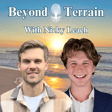
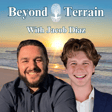
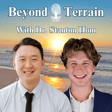
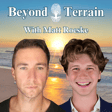

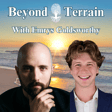
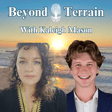
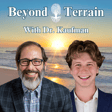
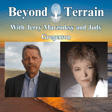
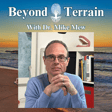
![DNA Doesn't Exist & Genomic Nonsense with Dr. Jerneja Tomsic [Part 2] image](https://media.zencastr.com/cdn-cgi/image/width=112,quality=85/image-files/652933f3a749dc383eb375de/ce5a5fd9-98c9-44fe-9b4b-3d0cd5abcf29.png)
